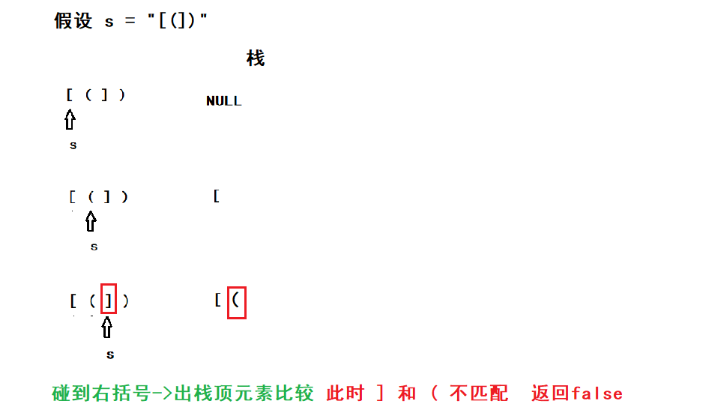Leetcode-有效的括号
【摘要】 大家好,我是芒果,一名非科班的在校大学生。对C/C++、数据结构、Linux及MySql、算法等领域感兴趣,喜欢将所学知识写成博客记录下来。 希望该文章对你有所帮助!如果有错误请大佬们指正!共同学习交流作者简介:CSDN C/C++领域新星创作者https://blog.csdn.net/chuxinchangcun?type=blog掘金LV3用户 https://juejin.cn/u...
大家好,我是芒果,一名非科班的在校大学生。对C/C++、数据结构、Linux及MySql、算法等领域感兴趣,喜欢将所学知识写成博客记录下来。 希望该文章对你有所帮助!如果有错误请大佬们指正!共同学习交流
作者简介:
CSDN C/C++领域新星创作者https://blog.csdn.net/chuxinchangcun?type=blog
掘金LV3用户 https://juejin.cn/user/1381426159953960
阿里云社区专家博主,星级博主,技术博主 https://developer.aliyun.com/profile/expert/5lkdbuggiiuhc
华为云云享专家 https://bbs.huaweicloud.com/community/myhomepage
题目

由题意可知
- 字符串仅由左右括号组成
- 左括号:({[
- 右括号: )}]
错误想法1:统计左右括号的数量,如果左括号数量 == 右括号数量 返回true
例如:([)] ->这样左右括号数量虽然一样,但是并不匹配
- 正确想法: 使用栈的后进先出特性
- 遍历字符串s,如果为碰到左括号就进栈,s++往后走
- 如果碰到右括号,就出栈顶元素进行比较,如果不匹配,返回false,如果匹配,s++往后走
- ==注意:返回前都要先销毁栈空间==

特殊情况:
1.碰到右括号,要出栈顶元素时,栈中无元素了 ->匹配失败
2.最后遍历完字符串,若栈中还有元素 ->匹配失败

实现的接口:
bool isValid(char * s)
{
//空字符串
if(*s == '\0')
{
return false;
}
//空指针
if(s == NULL)
{
return false;
}
ST st;//创建栈
StackInit(&st);//栈初始化
//遍历字符串
while(*s)
{
//碰到左括号就进栈
if(*s == '{'
|| *s == '['
|| *s == '(')
{
StackPush(&st,*s);//左括号进栈
s++;//s向后走
}
else
{
//碰到右括号,出栈顶的左括号进行匹配
//如果栈中没有元素与右括号进行匹配->栈为空,匹配失败
if(StackEmpty(&st))
{
//返回前要释放栈
StackDestroy(&st);
return false;
}
else
{
STDataType tmp = StackTop(&st); //得到栈顶元素进行比较
StackPop(&st);//弹出栈顶元素
//不匹配则返回false
if(tmp != '{' && *s =='}'
|| tmp != '[' && *s ==']'
|| tmp != '(' && *s ==')')
{
//返回前要释放栈
StackDestroy(&st);
return false;
}
//如果匹配,则s往后走
else
{
s++;
}
}
}
}
//如果比较完了之后,还要看栈是否为空,如果栈中还有元素,说明不匹配
bool tmp = StackEmpty(&st);
//返回前要释放空间
StackDestroy(&st);
return tmp;
}
总的代码
//现在栈存放的是字符
typedef char STDataType;
typedef struct Stack
{
STDataType* a;
int top;
int capacity;
}ST;
void StackInit(ST* ps);
void StackDestroy(ST* ps);
void StackPush(ST* ps, STDataType x);
void StackPop(ST* ps);
STDataType StackTop(ST* ps);
int StackSize(ST* ps);
bool StackEmpty(ST* ps);
void StackInit(ST* ps)
{
assert(ps);
ps->a = NULL;
ps->top = 0; // ps->top = -1;
ps->capacity = 0;
}
void StackDestroy(ST* ps)
{
assert(ps);
free(ps->a);
ps->a = NULL;
ps->capacity = ps->top = 0;
}
void StackPush(ST* ps, STDataType x)
{
assert(ps);
if (ps->top == ps->capacity)
{
int newCapacity = ps->capacity == 0 ? 4 : ps->capacity * 2;
STDataType* tmp = realloc(ps->a, sizeof(STDataType)*newCapacity);
if (tmp == NULL)
{
printf("realloc fail\n");
exit(-1);
}
ps->a = tmp;
ps->capacity = newCapacity;
}
ps->a[ps->top] = x;
ps->top++;
}
void StackPop(ST* ps)
{
assert(ps);
assert(!StackEmpty(ps));
ps->top--;
}
STDataType StackTop(ST* ps)
{
assert(ps);
assert(!StackEmpty(ps));
return ps->a[ps->top - 1];
}
int StackSize(ST* ps)
{
assert(ps);
return ps->top;
}
bool StackEmpty(ST* ps)
{
assert(ps);
/*if (ps->top == 0)
{
return true;
}
else
{
return false;
}*/
return ps->top == 0;
}
bool isValid(char * s)
{
//空字符串
if(*s == '\0')
{
return false;
}
//空指针
if(s == NULL)
{
return false;
}
ST st;//创建栈
StackInit(&st);//栈初始化
//遍历字符串
while(*s)
{
//碰到左括号就进栈
if(*s == '{'
|| *s == '['
|| *s == '(')
{
StackPush(&st,*s);
s++;
}
else
{
//碰到右括号,出栈顶的左括号进行匹配
//如果栈中没有左括号了->栈为空,匹配失败
if(StackEmpty(&st))
{
//返回前要释放栈
StackDestroy(&st);
return false;
}
else
{
STDataType tmp = StackTop(&st);
StackPop(&st);
if(tmp != '{' && *s =='}'
|| tmp != '[' && *s ==']'
|| tmp != '(' && *s ==')')
{
//不匹配
//返回前要释放栈
StackDestroy(&st);
return false;
}
else
{
s++;
}
}
}
}
//如果比较完了之后,栈中还有元素,说明不匹配
bool tmp = StackEmpty(&st);
//返回前要释放空间
StackDestroy(&st);
return tmp;
}
【声明】本内容来自华为云开发者社区博主,不代表华为云及华为云开发者社区的观点和立场。转载时必须标注文章的来源(华为云社区)、文章链接、文章作者等基本信息,否则作者和本社区有权追究责任。如果您发现本社区中有涉嫌抄袭的内容,欢迎发送邮件进行举报,并提供相关证据,一经查实,本社区将立刻删除涉嫌侵权内容,举报邮箱:
cloudbbs@huaweicloud.com
- 点赞
- 收藏
- 关注作者


评论(0)